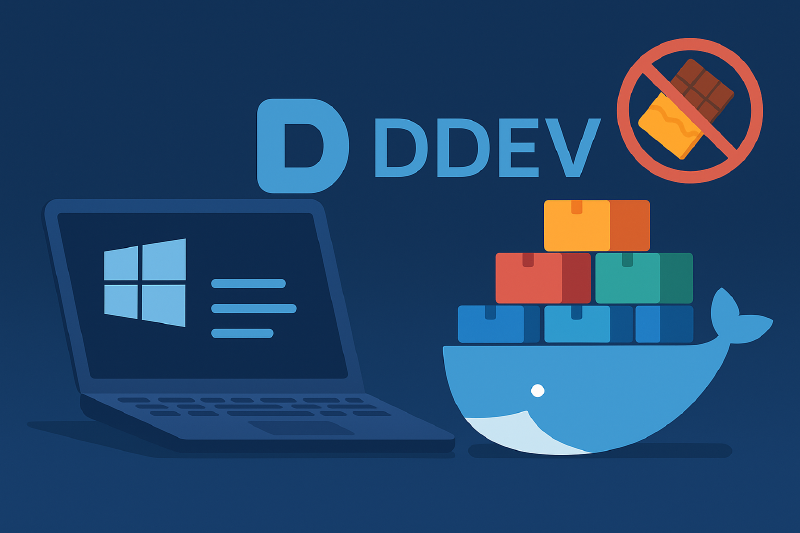TL;DR
After watching my enterprise client’s Drupal developers lose hours every week wrestling with raw Docker Compose for local development, I championed a switch to DDEV, the open‑source tool that gives “container superpowers with zero required Docker skills” (ddev.com). One of the snags on their Windows laptops was the Chocolatey package manager, whose install path clashed with locked‑down corporate security policies. Working with DDEV maintainer Randy Fay, I removed the Chocolatey dependency, paving the way for a leaner installer that shipped in version 1.24.5. Development team members now onboard much quicker, and leadership can point to measurable productivity gains.
The Starting Point: Docker Compose Drag
My client’s legacy workflow relied on a bespoke Docker Compose stack. Developers routinely diverted time to babysit containers as well as copying their work in and out, instead of writing code. This echeos industry findings that more than 58% of engineers lose 5‑plus hours per week to “unproductive work”. This DevOps overhead impacts their developer experience (DX), which is a distraction from their actual work.
Enter DDEV
DDEV abstracts all that Docker plumbing with simple commands (e.g. ddev start, ddev stop) while still running everything locally. Its promise, “environments in minutes, multiple concurrent projects, and less time to deployment”, resonated immediately.
Why It Mattered for Drupal
A Drupal codebase is never just PHP; it drags along Composer, Drush, front‑end toolchains, and database snapshots. DDEV’s predefined Drupal preset provides a reproducible stack with Nginx/Apache, MariaDB, and Mailhog out of the box.
A Windows Speed‑Bump Called Chocolatey
The developers work on locked‑down Windows laptops. DDEV’s install script used the Chocolatey package manager, which corporate policies block from writing to its default location. Workarounds involved various hurdles, exactly the sort of DevOps toil they wanted to eliminate.
Collaborating Upstream: Issue #6636 → PR #7049
While in research mode, I discovered Issue #6636, maintainers themselves wanted to drop Chocolatey but hadn’t had the bandwidth to do so. I volunteered a pull request that:
- removed Chocolatey from the installation process, and
- no longer required an Administrator Powershell; an unprivileged user could install it in a terminal.
The patch was merged on April 10, 2025.
Release v1.24.5: Goodbye Chocolatey
A month later, the change landed in v1.24.5 with a shout‑out in the release notes: “Chocolatey removed from automated Windows installation scripts. Thanks to @colans.” It’s now simpler for Windows developers to install DDEV, and they don’t have to be an administrator.
Business Case (as pitched to leadership)
“Container superpowers with zero required Docker skills” isn’t just marketing. Here’s the quantified rationale I presented:
- Zero Docker config:
ddev startreplaces hand‑rolled Compose files. - No central registry maintenance: Images build locally.
- Host‑level commands:
ddev drush statusorddev composer installwithoutdocker exec. - Unified file system: The code lives on the host, eliminating copy‑in/out cycles.
- Safe rebuilds: Deleting containers never loses work.
- Always‑on Git:
blame,diff, andbranchwith the active code without stepping into the container. - First‑class Composer: Composer‑managed Drupal is just a
ddev composer requireaway.
Outcomes
- Onboarding time dropped from half a day (or more) to an hour (or less).
- Additonal support for broken sandboxes fell to nearly zero.
- Developers now focus on development, not troubleshooting containers, or moving code in and out of them.
Gratitude
I’d like to thank Randy Fay for prompt code reviews, patient feedback, and for shepherding the change into a release.
Ready to Try?
Head to the official DDEV installation documentation and give it a spin. And if you’re stuck on Windows, it’s now much easier to install.
